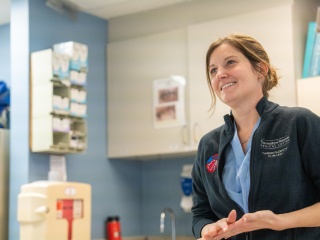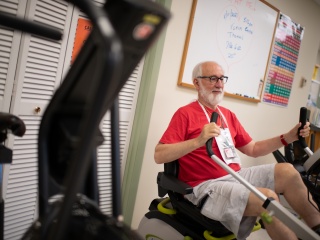Atherosclerosis
Atherosclerosis Care at UVM Health
Atherosclerosis, or hardening of the arteries, occurs when fat (cholesterol), inflammatory cells (white blood cells) and calcium build up in your arteries, which carry blood to and from your heart. This buildup, called plaque, causes your arteries to thicken and narrow over time, and makes it difficult for blood to flow efficiently throughout your body. When atherosclerosis affects these arteries, it is referred to as coronary artery disease.
Atherosclerosis is a progressive condition and can result in heart attack or stroke. However, if it’s detected early, you can often manage the disease through lifestyle changes and medication.

Why Choose UVM Health?
At University of Vermont Health, we take a coordinated, team-based approach to diagnosing and treating atherosclerosis. Our network of heart and vascular providers gives you access to advanced specialists, so no matter where you live in Vermont or northern New York, you can get personalized care that helps you live a full, healthy and pain-free life. We offer:
- Specialized experts: Our general cardiologists, interventional cardiologists, cardiac surgeons, vascular surgeons and stroke specialists collaborate to determine what treatment is right for you and make sure you get the very best care.
- Advanced treatment options: When lifestyle changes and medications alone don’t manage coronary artery disease, you have access to advanced interventional procedures and surgeries. Our interventional cardiologists are the only providers in Vermont offering catheter-based treatments as an alternative to open-heart surgery.
- Care grounded in research: Our health system gives you access to active researchers, leading-edge technology and advanced treatments that include promising new therapies through clinical trials when appropriate.
What Causes Atherosclerosis?
There can be many causes of atherosclerosis or coronary artery disease. Some of the most common risk factors include:
- Smoking
- A diet high in fat
- Not exercising regularly
Types of Atherosclerosis
Atherosclerosis can affect any of the arteries that supply the heart or lead from the heart to the rest of the body. Depending on the arteries affected, different complications can occur. Atherosclerosis most commonly affects the:
- Heart (coronary) arteries (coronary artery disease)
- Leg arteries
- Carotid or cerebral arteries (brain arteries)
Symptoms of Atherosclerosis
Symptoms of atherosclerosis depend on which arteries are affected. They may include:
- Chest pain or pressure (angina)
- Shortness of breath
- Weakness in your arms or legs, slurred speech or drooping muscles in your face
- Confusion
- Fatigue
- Leg or arm pain
- High blood pressure
If you develop atherosclerosis, you are at risk for:
- Angina
- Heart attack
- Stroke
- Claudication (pain in your legs when you walk)
- Chronic kidney disease
Atherosclerosis can be treated more successfully the earlier it is detected. If you experience any of the above symptoms, contact your doctor.
Wellness & Prevention
Evidence shows that proactive health care focused on preventing illness leads to better outcomes. We're here to help you live a healthier, happier life. We offer wellness and prevention services to empower you to take control of your health.

Diagnosing Atherosclerosis
To diagnose atherosclerosis, your cardiologist will conduct a physical exam. From there, they will typically order one or more diagnostic tests to confirm the diagnosis.
Atherosclerosis diagnosis and testing may include:
- Electrocardiogram (EKG): Records your heart’s electrical activity and identify any abnormal rhythms and stress to the heart
- Blood tests: Detects high levels of cholesterol or blood sugar
- Echocardiogram: Creates a video image of your heart pumping blood and evaluate your heart’s function and structure
- Stress tests: Monitor your heart rhythm, breathing and blood pressure while you exercise. The test identifies blockages in the blood vessels that supply the heart and evaluates your heart rhythm and blood pressure response to exercise.
- Nuclear imaging or an echocardiogram: Usually used in combination with a stress test to evaluate the structure and function of your heart after exercise. This is a more sensitive test to find blockages in the blood vessels that supply the heart. For those who can’t exercise, medication can be combined with imaging.
- Cardiac catheterization or angiogram: Identifies blocked or narrowed arteries using a long, thin tube (catheter), a special dye and imaging tools
- Blood tests: Look for chemical markers of heart failure
- Doppler ultrasound: Assesses blood flow in the vessels to your brain (carotid arteries) and in the vessels to your arm or leg
- Ankle-brachial index (ABI): Compares the blood pressure in your leg with the blood pressure in your arm, to help detect vascular disease
Atherosclerosis Treatment
The goal of treatment is to slow the progression of the disease and lower your risk for heart attack and stroke. Your cardiologist may take a variety of approaches to treat your condition.
Your cardiologist will likely recommend lifestyle changes as the first course of treatment, to help lower your risk of heart attack and stroke. These may include:
- Following a heart-healthy diet
- Exercising regularly
- Managing stress
- Quitting smoking
Your cardiologist may prescribe medicines to help manage your condition. Common medications include statin medications, which lower your cholesterol level and decrease your chances of having a heart attack or stroke.
Your provider may also recommend other medications to help:
- Lower your blood pressure
- Lower your blood sugar
- Prevent blood clots
- Prevent inflammation
If lifestyle changes and medication are not providing relief for your symptoms, your provider may recommend surgery. Our team of experienced cardiac surgeons and interventional cardiologists will help determine which procedure is right for you. Common surgeries include:
- Percutaneous coronary intervention (PCI): Also known as coronary angioplasty, is a procedure that uses a catheter to open a blocked or narrowed artery. Your interventional cardiologist may place a mesh tube (stent) in the artery during surgery to keep it open. This procedure helps blood flow more normally to the heart muscle.
- Coronary artery bypass grafting (CABG): A procedure in which your surgeon will go around, or bypass, the narrowed or blocked portion of an artery using a blood vessel taken from elsewhere in your body (usually the chest or leg). CABG can relieve chest pain and improve blood flow throughout the body.
- Carotid endarterectomy: A procedure in which fatty buildup (plaque) is removed from one of the carotid arteries through an incision in the neck.
Locations Near You
Share your location to see nearby providers and availability
118 Tilley Drive
Suite 102
South Burlington, VT 05403-4450
75 Park Street
Elizabethtown, NY 12932
101 Adirondack Drive
Suite 1
Ticonderoga, NY 12883
133 Park Street
Malone, NY 12953
62 Tilley Drive
Suite 101
South Burlington, VT 05403-4407
133 Park Street
2nd Floor
Malone, NY 12953-1244
130 Fisher Road
MOB-A Suite 2-1
Berlin, VT 05602-9000
214 Cornelia Street
Suite 203
Plattsburgh, NY 12901-2332
115 Porter Drive
Middlebury, VT 05753-8527


